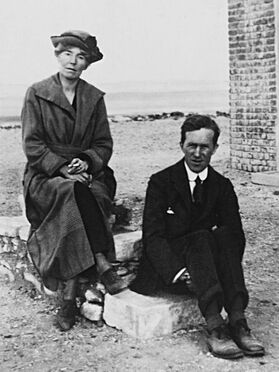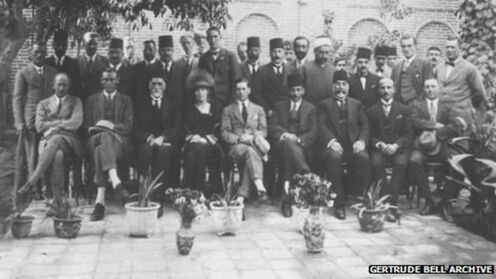 Gertrude Bell and T.E. Lawrence Gertrude Bell and T.E. Lawrence A recent Public Broadcasting Service telecast, Letters from Bagdad, reminds us of another woman who had a great influence during World War (WWI), Gertrude Bell. Her sphere of influence was in the Eastern Front. Her path often crossed with Englishmen T.E. Lawrence, better know as Lawrence of Arabia, and Winston Churchill. Beginnings Gertrude Margaret Lowthian Bell was born in1868, and by the time of her death in 1926, she would be known among other things as an English writer, scholar, historian, archeologist, linguist, and political officer. Her mother died when she was two years old, and her father remarried six years later. In 1892 she went to live and study with a diplomatic family friend in Teheran. She loved the Arabic language, had taken up photography, and published her first book, Syria: The Desert and the Sown, in 1907. By then she was determined to remain in the East. The Bell Map At the start of the war, the Arabs held her as a spy for a short period in Hayyil. They refused to let her travel, took her money, and placed her in solitary confinement. She was in the middle of a raging war zone, and many historians are still of the opinion that she was a British spy. Bell’s contributions in the Middle East during WWI are considered unmatched by many. The British in Cairo knew that the Arabs would be influential to success in the Eastern Theater. Her job became gathering and sorting of information. Her cartography skills and extensive travels from 1900-1913 among the various tribes using her linguistic skills enabled her to develop the “Bell Map” used by the military throughout and after the war. She knew where certain sheiks were located, their language, and their culture. This made her highly influential to British imperial policy-making throughout Greater Syria, Mesopotamia, Asia Minor, and Arabia. Along with T. E. Lawrence, she helped support the political and hereditary leaderships in what are today Jordan and Iraq.  Post-War Challenges We can see that Bell played an important role in negotiations regarding the Ottoman Empire after the war by her positioning in famous photos, always front and center. In one, she is on a camel in front of the Egyptian Sphinx between Lawrence and Churchill, also on camels. In another at the Cairo Conference in 1921, along with an entourage of military and diplomatic types. At the 1924 High Commission meeting in Baghdad, she’s seated with colleagues and Arab ministers. Always the only woman. She and Lawrence began to see that the British, who had promised the Arabs an independent state if they worked with the British, might not keep their promise after the war. They fought for the Arabs during the 1919 Peace Accords. She played a major role in establishing and helping administer the modern state of Iraq, by attempting to draw new boundary lines around the country. In 1921 she was pleased when Faisal ibn Hussain was named King of Iraq, but was later disillusioned when she was no longer sought in a policy-making role. In the mid-1920s Bell became Director of Antiquities in Baghdad, specifically to oversee the building of the Iraq Museum in Baghdad. She eventually suffered a breakdown, and her family convinced her to come home. But England was no longer home, and she returned quickly to Iraq, intent on finishing the museum. A final depression soon set in, and she died in Baghdad in 1926. But she finished her work. Her last letter home described the opening of the new Iraq Museum. During her lifetime she was highly esteemed and trusted by British officials and exerted an immense amount of power. She has been described as "one of the few representatives of His Majesty's Government remembered by the Arabs with anything resembling affection.” If you’d like to learn more about this intriguing historical woman, Georgina Howell’s book is a good source. Sources: Gertrude Bell: Queen of the Desert, Shaper of Nations, Georgina Howell, 2006 and the links highlighted in the above text. Ann Otto writes fiction based on factual as well as oral history. Her debut novel, Yours in a Hurry, about Ohioans relocating to California in the 1910’s, is available on-line at Amazon, Barnes & Noble, Kindle, and at locations listed on her website at www.ann-otto.com. Ann’s academic background is in history, English, and behavioral science, and she has published in academic and professional journals. She enjoys speaking with groups about all things history, writing, and the events, locations, and characters from Yours in a Hurry. She is currently working on her next novel about Ohio’s Appalachia in the 1920’s and prepared for future works by blogging about a recent World War 2 European tour. She can be reached through the website, or on Facebook @Annottoauthor or www.Goodreads.com.
0 Comments
Leave a Reply. |
Archives
August 2020
Categories
All
|
 RSS Feed
RSS Feed